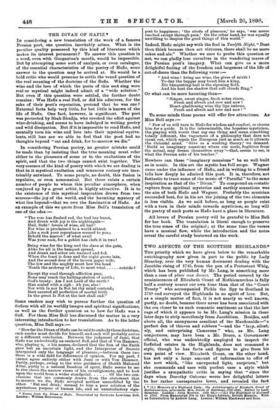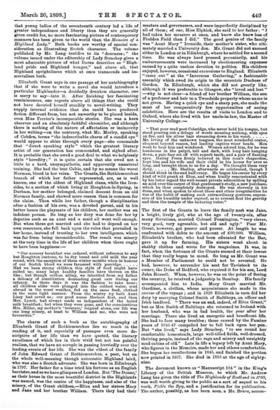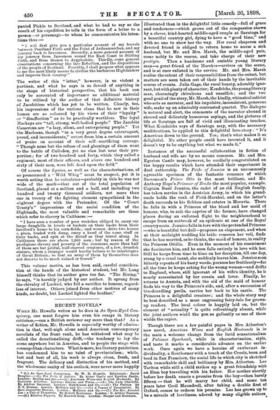TWO ASPECTS OF THE SCOTTISH HIGHLANDS.*"
THE priority which we have given below to the remarkable autobiography now given in part to the public by Lady Strachey, over the very human document dealing with the Jacobite rising of 1745, from the pen of a Protestant Whig, which has been published by Mr. Lang, is something more than a case of place aux dames. The period covered by the reminiscences of Elizabeth Grant of Rothiemurchus is fully half a century nearer our own time than that of the "Court Trusty" who accompanied Pickle the Spy to Scotland in 1749 and surveyed the Highlands in no spirit of love. Bat, as a simple matter of fact, it is not nearly so well known, partly, no doubt, because there never has been associated with the era closer to us such romantic sentiment as that the last rags of which it appears to be Mr. Lang's mission in these later days to strip mercilessly from Jacobitism. Besides, and above all, the anonymous assailant of the Macdonalds—" a perfect den of thieves and robbers "—and the "lazy, silent, sly, and enterprising Camerons " who, as Mr. Lang conjectures, may have been a Mr. Bruce, a Governmeat official, who was undoubtedly employed to inspect the forfeited estates in the Highlands, does not command a. style, though he has facts and figures to give from his own point of view. Elizabeth Grant, on the other hand, has not only a large amount of information to offer of the sort which, "like unexpected light, surprises," but she commands and uses with perfect ease a style which justifies a sympathetic critic in saying that "since the days when Dorothy Osborne wrote her delightful letters to her rather unresponsive lover, and revealed the fact I • (1.) Memoirs of a Highland Lady the Autobiography of Elisabeth Grant of Bothisisurchus, afterwards Mrs. Smith of Baltiboys. 1797-1830. Edited by Lady Strachey. London : John Murray. IlOs 6d.]—(2.) The Highlands of Scotland in 1760. From Manuscript 104 in the King's Library, British Museum. With an Introduction by Andrew Lang. London: William Blackwood and Sons.
that young ladies of the seventeenth century led a life of greater independence and liberty than they are generally given credit for, no more fascinating picture of contemporary manners has been given to the world than the Memoirs of a Highland Lady." Both books are worthy of special con- sideration as illustrating Scotch character. The volume published by Mr. Lang testifies to its "dourness;" the volume issued under the editorship of Lady Strachey gives a most admirable picture of what Burns describes as "High- land pride and Highland hunger," and above all, that Highland sprightliness which at once transcends and im- mortalises both.
Elizabeth Grant says in one passage of her autobiography that if she were to write a novel she would introduce a particular Highlander—a decidedly drunken character, one is sorry to say—into it. After finishing her fascinating reminiscences, one regrets above all things that she could not have devoted herself steadily to novel-writing. They supply internal evidence that she could have produced fiction different from, but not unworthy to be placed beside, even Miss Ferrier's incomparable stories. She was a keen observer and an absolutely faithful chronicler, and although there is nothing of the nature of affectation or insincerity in her writing—on the contrary, what Mr. Morley, speaking of Cobden, terms "the indescribable charm of a candid eye" would appear to shine through every page—she commands that "direct speaking style" which the greatest literary artist of our generation has commended, and sighed after. It is probable that she owed a good deal to what we helplessly style " heredity ; " it is quite certain that she owed not a little to a hard, unsympathetic, and apparently unnatural training. She had the best Celtic, and by no means the worst Norman, blood in her veins. The Grants, the Rothiemurchus branch of which her father represented, are, as is well known, one of the oldest of Highland clans, while the Iron- sides, to a section of which living at Houghton-le-Spring, in Durham, her mother belonged, claimed descent from an old Norman family, and showed more reason than is common for the claim. Then while her father, though a disciplinarian after a fashion of his own, was a devoted parent, and in his better hours the playmate of his children, her mother was an indolent person. So long as her duty was done for her by deputies such as an aunt and a maid all went well enough.
• But when these got married and she had to depend on her own resources, she fell back upon the rules that prevailed in her home, instead of trusting to her own intelligence, which was far from being inconsiderable. The result was misery at the very time in the life of her children when there ought to have been happiness:—
"Our nursery breakfast was ordered, 'without referenoe to any but Houghton customs, to be dry bread and cold milk the year round, with the exception of three winter months when in honour of our Scotch blood we were favoured with porridge Had we been strong children this style of food might have suited us; many large healthy families have thriven on the like ; but though seldom ailing, we inherited from my father a delicacy of constitution demanding great care during our infancy. In those days it was the fashion to take none ; all children alike were plunged into the coldest water, sent abroad in the worst weather, fed on the same food, clothed in the same light manner. From the wintry icy bath Aunt Lissy had saved us ; our good nurse Herbert first, and then 3/(r8. Lynch, had always made us independent of the hated milk breakfast ; but when they were gone, and the conscientious Mrs. Millar, my mother's 'treasure,' reigned alone, our life was one long misery, at least to William and me, who were not favourites."
The charm of such a book as the autobiography of Elizabeth Grant of Rothiemurchus lies so much in the
reading of it, and especially of passages even more de- scriptive of her life than we have quoted, the literary excellence of which lies in their vivid but not too painful realism, that we have no scruple in passing hurriedly over the leading events of her life. She was the eldest of the family of John Edward Grant of Rothiemurchus, a poor, but on the whole well-meaning though autocratic Highland laird, who was also a Scotch advocate. She was born in Edinburgh in 1797. Her father for a time tried his fortune as an English barrister, and so we have glimpses of London. But 'The Donne,' as their house in the most beautiful district in the Highlands was named, was the centre of the happiness, and also of the misery, of the Grant children,—Eliza and her sisters Mary and Jane and her brother William. There they had their masters and governesses, and were imperfectly disciplined by all of them ; of one, Miss Elphick, she said to her father : "1 had taken her measure at once, and knew she knew lees of Flodden Field than I did." The good genius of the family was "Aunt Mary" Ironside, their mother's sister, who ulti- mately married a University don. Mr. Grant did not succeed either in London or in Edinburgh, where he settled for a second time. He was always hard pressed pecuniarily, and his embarrassments were increased by electioneering expenses caused by a quite useless devotion to politics. His children enjoyed, however, occasional excursions to England. Elizabeth "came out" at the "Inverness Gathering," a fashionable assembly which owed its origin to the eccentric Duchess of Gordon. In Edinburgh, which she did not greatly like. although it was preferable to Glasgow, she "loved and lost" —why is not clear—a friend of her brother William, the son of a professor and heir to a Tweedside property whose name is not given. Having a quick eye and a sharp pen, she made the most of her comparatively few opportunities of seeing celebrities. Here are the results of visits to London and to Oxford, where she lived with her uncle-in-law, the Master of University College :—
" That poor mad poet Coleridge, who never held his tongue, but stood pouring out a deluge of words meaning nothing, with eyes on fire, and his silver hair streaming down to his waist Mr. Irving of the unknown tongues, the most wonderful orator, eloquent beyond reason, but leading captive wiser heads. Men went to hear him and wondered. Women adored him, for he was handsome in the pulpit, tall and dark, with long hair hanging down, a pale face set off with superb teeth, and a pair of flashing eyes. Batley Frere firmly believed in this man's rhapsodies, kept him and his wife and their child in his house for ever so long, and brought them to us for a day. We thought them very dirty. . . . . . Mr. Shelley, afterwards so celebrated, though I should think in the end half-crazy. He began his career by every kind of wild prank at Eton, and when kindly remonstrated with by his tutor repaid the well-meant private admonition by spilling an acid over the carpet of that gentleman's study, a new purchase, which he thus completely destroyed. He was slovenly in his dress, and when spoken to about these and other irregularities he was of the habit of making such extraordinary gestures, expres- sive of his humility under reproof, as to overset first the gravity and then the temper of the lecturing tutor."
The first of the Grants to leave the family nest was Jane, a bright, lively girl, who at the age of twenty-six, after many flirtations, married Colonel Pennington, "very clever, very good, very agreeable, but old and ugly." Poor Mr. Grant, however, got poorer and poorer. At length he was. confronted with debts to the amount of £60,000. William, Elizabeth's brother, who had been educated for the Bar, gave it up for farming. His sisters went about in shabby clothes and wrote for the magazines. It was, in fact, when the fortunes of the Grants seemed at their lowest that they really began to mend. So long as Mr. Grant was a Member of Parliament he could not be arrested. He had, however, to surrender his seat for Tavistock to its owner, the Duke of Bedford, who required it for his son, Lord John Russell. When, however, he was on the point of fleeing the country, he received a judgeship in Bombay. His family accompanied him to India. Mary Grant married Mr. Gardiner, a civilian, whose acquaintance she made in the course of the voyage ; and in 1829 Elizabeth in tarn did her duty by marrying Colonel Smith of Baltiboys, an officer and Irish landlord. "There was an end, indeed, of Eliza Grant,' but as Mrs. Smith of Baltiboys she returned to Ireland with her husband, who was in bad health, the year after her marriage. There she lived an energetic and beneficent me.
She had to face many troubles ; those caused by the Famine years of 1816-47 compelled her to fall back upon her pen. But "she lived," says Lady Strachey, "to see round her comfortable homesteads, large well-tilled fields, well-dressed, thriving people, instead of the raga and misery and unsightly mud-cabins of old." Late in life a legacy left by Aunt Mary, who figures in the Memoirs, made her and others comfortable.
She began her recollections in 1845, and finished the portion now printed in 1867. She died in 1885 at the age of eighty- nine.
The document known as "Manuscript 104" in the King's Library of the British Museum, to which Mr. Andrew Lang has given the title of The Highlands of Scott snd in 1750, was well worth giving to the public as a sort of sequel to his work, Pickle the Spy, and a justification for its publication.
The author, possibly, as has been seen. a Mr. Brune, aocom- partied Pickle to Scotland, and what he had to say as the result of his expedition he tells in the form of a letter to a person—or personage—to whom he communicates his inten-
tions thus:— "1 will first give you a particular account of my travels between Pentland Firth and the Point of Ardnamurchan, and my journey back to Inverness. Secondly, a more general account of my journey from Inverness round the East Coast to Stirling Firth, and from thence to Argyleshire. Thirdly, some general observations concerning the late Rebellion, and the dispositions of the people of Scotland. Fourthly, I shall propose what appears to rim the most likely means to civilise the barbarous Highlanders and improve their country."
The writer of this "letter," however, is so violent a partisan, and what he says is so devoid of anything in the shape of historical perspective, that his book can only be accounted of importance as additional material to be utilised by the author of that definitive history of Jacobitism which has yet to be written. Clearly, too, his impressions of the various clans that he saw in their homes are so coloured by his views of their "loyalty" or " disaffection " as to be practically worthless. The loyal Mackays are "tall, strong, well-bodied people." The Jacobite Camerons are "a lazy, silent, and enterprising people." Yet the Macleans, though "to a very great degree extravagant, proud, and inconsiderate," extort from him a certain amount of praise on account of their self - sacrificing courage. *" Though none but the refuse of and gleanings of them went to the battle of Culloden, yet no clan lost near their pro- portion ; for of two hundred and forty, which they called a regiment, most of their officers, and above one hundred and sixty of their men, were left dead upon the field."
Of course the figures, as well as the characterisations, of so pronounced a Wild Whig" must be suspect, yet it is worth noting that he calculates—probably in this he was not wide of the mark—that out of the total population of
Scotland, placed at a million and a half, and including two hundred and twenty thousand soldiers, not more than one in twenty of the fighting element sympathised in the slightest degree with the Pretender. Of the "Court Trusty's" impressions of the social condition of the Highlands, the most valuable and remarkable are those which refer to slavery in Caithness :—
" I have seen a number of poor wretches obliged to carry out large dunghills in kreels or baskets on their backs from their landlord's house to his corn-fields ; and women drive two horses a piece, loaded with dung, carry a kreel of the same stuff on their backs, and spin at the distaff as they travel along. In Caithness there are above 1,500 men ; but by reason of the prodigious slavery and poverty of the commons, more than half of them are but pitiful, half-starved creatures, of a low, dwarfish stature, whom a stranger would hardly believe to be inhabitants of Great Britain ; so that an army of them by themselves does not deserve to be much valued or feared."
This volume merits, as has been said, careful considera- tion at the hands of the historical student, but Mr. Lang himself thinks that its author goes too far. "The Rising," he says, "is harshly judged by our author. It sprang from the chivalry of Lochiel, who fell a sacrifice to honour, regard- less of interest. Others joined from other motives of many kinds, no doubt, but Lochiel lighted the heather."








































 Previous page
Previous page